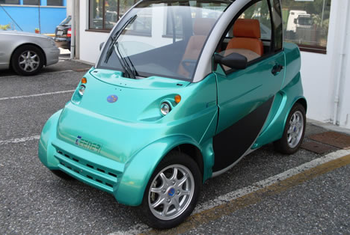UW-Madison to receive electric ‘micro cars’ for sustainability research
Four unique electric “micro cars” are coming to UW–Madison soon, part of a new research project that aims to reduce the university’s carbon footprint, gather data and initiate more sustainability research among faculty members and students.

Four Innova Dash electric vehicles will connect to UW–Madison’s wireless network and be able to communicate data for sustainability research.
Photo: Innova UEV
UW-Madison is one of four institutions receiving four Innova Dash all-electric vehicles this summer. The cars, called “new urban electric vehicles,” will connect to the UW’s wireless network and will be equipped with tablet-sized personal computers. They will be able to communicate data such as position, speed and battery charge directly to the network, which will provide the information to various research projects.
“We will utilize these electric vehicles to reduce the energy footprint of the campus community as a whole and achieve the goals of increasing awareness among the campus community of the positive impact of electric vehicles, designing strategies for optimally using a pool of electric vehicles by understanding how campus uses them, and exploring techniques for improved connectivity between the Internet-based services and electric vehicles,” said Suman Banerjee, project leader and professor of computer sciences.
“This project aligns with the University of Wisconsin–Madison’s efforts to address sustainability issues by the university’s research enterprise and outreach efforts. The campus has also made significant investments in infrastructure and community education that have significantly reduced energy consumption even while the campus has continued to grow.”
“This project aligns with the University of Wisconsin–Madison’s efforts to address sustainability issues by the university’s research enterprise and outreach efforts.”
Suman Banerjee
The UW’s project also includes Giri Venkataramanan, professor of electrical and computer engineering, and Patrick Christian, assistant director, network services, as co-investigators. Their work is being coordinated through the campus Office of Sustainability and with other organizations on campus, such as Transportation Services, Facilities, Planning & Management, and the Division of Information Technology, as well as a local utility company, Madison Gas and Electric.
Potential UW projects range from using the cars to create a shared pool to allowing participants to learn about the energy footprint of different vehicles and the potential carbon footprint reduction of electric alternatives. An online reservation system will be incorporated which will not only check availability, but also utilize information such as charge status of the batteries, and availability of charging stations near the desired location for decision making. The vehicles will be used like others in the local transportation fleet, so the UW will have ample opportunity to measure how they perform and how users adapt to their characteristics.
Colorado State University, the University of Pittsburgh and the University of Washington were also chosen to receive the cars. The four schools were selected by the nonprofit organization Internet2 and Innova UEV from a pool of eleven proposals. The UW–Madison project is also supported by its Division of Information Technology, which will provide wireless and cellular connectivity, as well as cloud computing resources for the various experiments.
